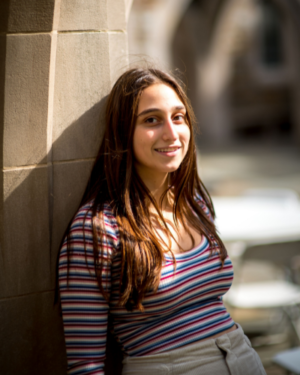American View
Being Jewish
Commentary
Teen Essay Winner: Speaking Up Against Antisemitism and More

Ok…cool…thanks!” I cringed as I thought about the words that came out of my mouth after a classmate said, “The Holocaust was a good thing because it was God’s will.”
Her words stunned me. Did she actually think the death of millions, including some of my own family members, was good? Why was I the only one who felt uncomfortable? I was ashamed for not saying something more.
My grandfather’s earliest memory is hiding under the bed at the age of 3 because the SS was searching for his father, a neighborhood butcher who had been taken into custody by the local police to protect him from the Nazis. His family fled Germany that night, barely making it out alive. Other family members were not as lucky.
It took me over a year to realize I should have said something in response to my classmate. I justified my silence by believing that I had no right to get angry because her statement reflected her beliefs. I pushed away my hurt and discomfort; I didn’t want to upset anyone.
But then a series of incidents occurred at my private Episcopal boarding school on the East Coast that made me change my mind:
• At a service, my school’s chaplain shared a New Testament verse that read “…the disciples were together, with the doors locked for fear of the Jewish leaders….” When a Jewish friend questioned the verse’s content, a teacher denied its antisemitic connotation.
• A student drew a Christmas card with a tree topped by a swastika that hung in a dormmate’s room.
• My friends told Holocaust “jokes.”
• I learned that one of the photographs that hangs in my school’s War Memorial Room is actually of a Nazi soldier.
I could no longer stay silent. I cared enough about myself, my heritage and my school community to do something about the antisemitism. I met with the chaplain, the teacher and the head of school. The results were mixed. The teacher was defensive, failing to realize that saying “fear of the Jewish leaders” teaches hate, and my school’s head (who has since retired) refused to address the antisemitism. The chaplain, however, apologized for the hurtful reading and asked me to talk to his religion class about Judaism.
While I wished for more, my experience of speaking up empowered me, making clear that when I advocate for what’s right, I can sometimes change people’s perspectives.
I felt motivated to expose other truths and decided to volunteer for the Plain Sight Project, which researches the names of enslaved people who lived in and helped build the East End of Long Island, including my hometown of East Hampton, N.Y., in order to bring these individuals into the American narrative. Horrified by the number of enslaved people who were erased from history, I decided to extend that search to see if there were any links to slavery at my school.
I learned that, indeed, the campus is located on the site of a former plantation, and that the family who ran it enslaved many people over generations. Barely anyone at my school was aware of that history.
I spoke to the new head of school, who listened with interest when I pointed out the hypocrisy of teaching about American slavery without acknowledging the existence of it on our campus. I also met with the history department and members of our Black affinity groups to figure out how to bring awareness of this history to current students and to create a memorial so that future generations can learn about it.
Before I spoke out about antisemitism, I was afraid, believing that I would offend someone if I shared my feelings. But then I realized that biased statements and willful blindness create and sustain bigotry, thereby harming people and undermining our communities. I realized that if even just one other person listened and joined the fight, my voice would be doubled. Together, the louder our battle cry will be.
READ MORE: Battling Antisemitism on Campus
Everett Rattray is a high school senior from East Hampton, N.Y. Her essay is the winner of our 2021 teen writing contest, co-sponsored with jGirls Magazine, which asked girls: “Tell us about a time in your life when antisemitism affected you and how you responded.”








 Facebook
Facebook Instagram
Instagram Twitter
Twitter
Rosalie wolf says
Everett: Congratulations on winning this essay context. I’d like to share my perspective from growing up in EH with your relatives, in the mid-20th century! Please contact me at rojwolf@gmail.com
if you are interested.
Cory Christopher T. says
I’ve read this deft, terse essay twice and sent it to others. Goood work, Evvie. I hope we can discuss it sometime soon, and that others at your school and beyond will do the same. Antisemitism can never be outed enough.
Warmly,
Chris